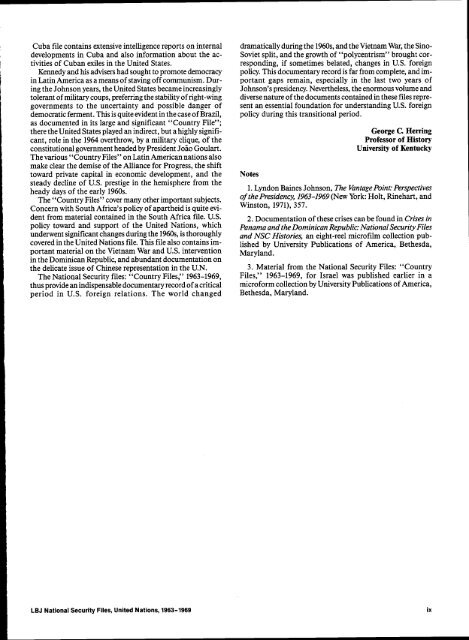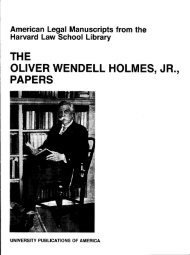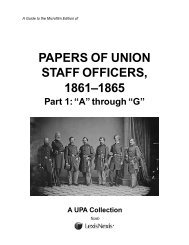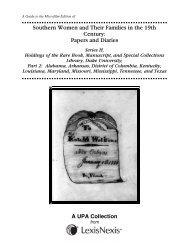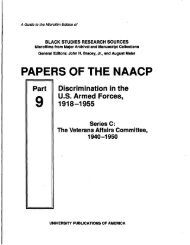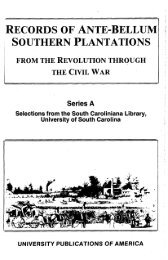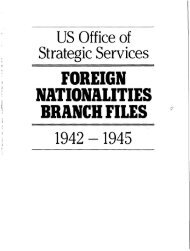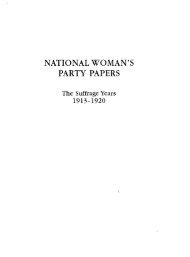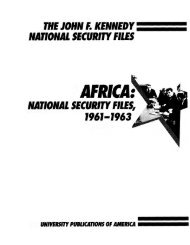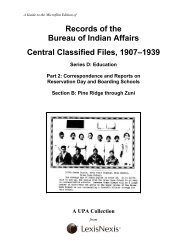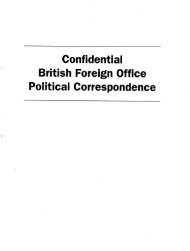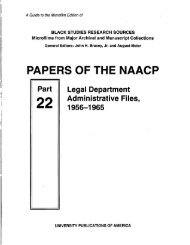THE UNITED NATIONS: - ProQuest
THE UNITED NATIONS: - ProQuest
THE UNITED NATIONS: - ProQuest
Create successful ePaper yourself
Turn your PDF publications into a flip-book with our unique Google optimized e-Paper software.
Cuba file contains extensive intelligence reports on internal<br />
developments in Cuba and also information about the ac-<br />
tivities of Cuban exiles in the United States.<br />
Kennedy and his advisers had sought to promote democracy<br />
in Latin America as a means of staving off communism. Dur-<br />
ing the Johnson years, the United States became increasingly<br />
tolerant of military coups, preferring the stability of right-wing<br />
governments to the uncertainty and possible danger of<br />
democratic ferment. This is quite evident in the case of Brazil,<br />
as documented in its large and significant "Country File";<br />
there the United States played an indirect, but a highly signifi-<br />
cant, role in the 1964 overthrow, by a military clique, of the<br />
constitutional government headed by President Joäo Goulart.<br />
The various "Country Files" on Latin American nations also<br />
make clear the demise of the Alliance for Progress, the shift<br />
toward private capital in economic development, and the<br />
steady decline of U.S. prestige in the hemisphere from the<br />
heady days of the early 1960s.<br />
The "Country Files" cover many other important subjects.<br />
Concern with South Africa's policy of apartheid is quite evi-<br />
dent from material contained in the South Africa file. U.S.<br />
policy toward and support of the United Nations, which<br />
underwent significant changes during the 1960s, is thoroughly<br />
covered in the United Nations file. This file also contains im-<br />
portant material on the Vietnam War and U.S. intervention<br />
in the Dominican Republic, and abundant documentation on<br />
the delicate issue of Chinese representation in the U.N.<br />
The National Security files: "Country Files," 1963-1969,<br />
thus provide an indispensable documentary record of a critical<br />
period in U.S. foreign relations. The world changed<br />
dramatically during the 1960s, and the Vietnam War, the Sino-<br />
Soviet split, and the growth of "polycentrism" brought cor-<br />
responding, if sometimes belated, changes in U.S. foreign<br />
policy. This documentary record is far from complete, and im-<br />
portant gaps remain, especially in the last two years of<br />
Johnson's presidency. Nevertheless, the enormous volume and<br />
diverse nature of the documents contained in these files repre-<br />
sent an essential foundation for understanding U.S. foreign<br />
policy during this transitional period.<br />
Notes<br />
George C Herring<br />
Professor of History<br />
University of Kentucky<br />
1. Lyndon Baines Johnson, The Vantage Point: Perspectives<br />
of the Presidency, 1963-1969 (New York: Holt, Rinehart, and<br />
Winston, 1971), 357.<br />
2. Documentation of these crises can be found in Crises in<br />
Panama and the Dominican Republic: National Security Files<br />
and NSC Histories, an eight-reel microfilm collection pub-<br />
lished by University Publications of America, Bethesda,<br />
Maryland.<br />
3. Material from the National Security Files: "Country<br />
Files," 1963-1969, for Israel was published earlier in a<br />
microform collection by University Publications of America,<br />
Bethesda, Maryland.<br />
LBJ National Security Files, United Nations, 1963-1969 IX


